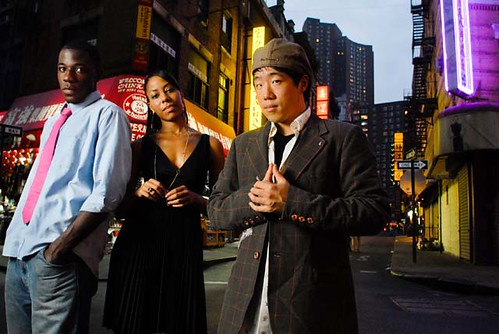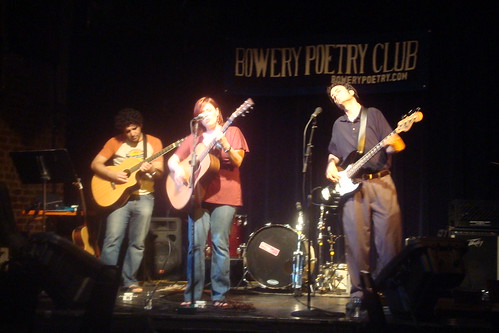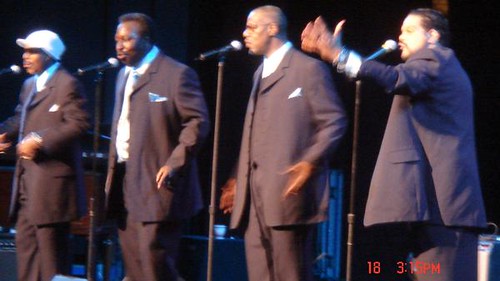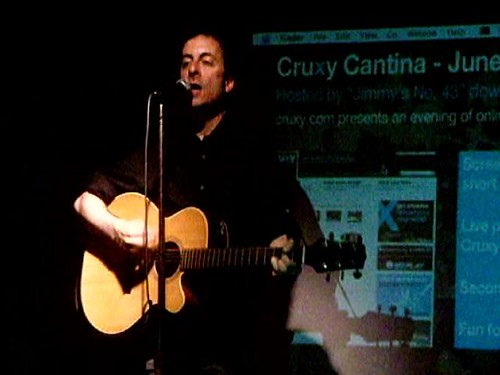I get a lot of CDs to review. Many, many CDs.
I mean, really, really a lot of CDs. Piles and piles. Rafts of them. Oodles. Myriads. Hosts.
Did I mention that I get a lot of CDs to review? Well, I do – a lot more than I could possibly give a careful listen to, much less write about. Yet I like to give everything a chance. What to do?
Like many people who work for a living, I have certain tasks that require total concentration, and others whose tedium is ameliorated by background music. So what I often do is throw CDs into my computer while I'm doing the latter kind of work, and see if something jumps out at me in the first couple of songs. If the music can catch my attention at low volume while I'm focused on something else, I figure the disc's worth a careful listen at home later. Usually the test works well.
But it wouldn't have worked for Johnny Irion's new disc, Ex Tempore. This CD is a very subtle set of songs. Fortunately, I'd heard a little about the artist before, through his work with Sarah Lee Guthrie, so I advanced the CD to my serious listening pile even though it hadn't passed the background-music test. The couple of splash moments I'd heard – a Beatles reference here ("Madrid"), a modestly catchy chorus there ("Roman Candle," "Eyes Like a Levee") – hadn't done the trick.
The danger in my method is that I might miss something with a new and original sound that requires close attention in order to "get" what it's about. And what makes Irion's CD special is that it has a new and original sound. Sure, it has influences and recognizable elements: folk-pop, glam rock, blue-eyed soul, Sonny Bono, The Band, and most directly, Neil Young in his wispy-voiced acoustic mode. But taken as a whole, it sounds like nothing else I've heard – a rare and welcome thing.
Irion serves up his topsy-turvy slices of life with grainy, unexpected lyrics and warmly rootsy but slightly off-kilter arrangements. People find their way through life: "I get a good cry every morning/Cuttin' up other people's onions/It's a good way and a good excuse/To let it all out." They philosophize, celebrate, and bemoan: "Casting my net a little wider every day/Somehow the big one always slips away."
But there's much more to it than evocative lyrics. Unlike 99% of pop music, these songs do unexpected things, both sonically and structurally. Imagination dominates. Irion speaks the pop language without using pop formulas. And it all falls together.
Glad I didn't let this one slip away. Listen up at his Myspace page
Anthony Robustelli, Another Fatal Blow
Cross Steely Dan with Stevie Wonder, add some Rufus and a little Randy Newman, and you'll have Anthony Robustelli's new CD. Reveling in its 1970s antecedents in spite of its digital-clean, 21st century home-studio timbre, the music bops and shivers like the best classic jazz-funk, decorated with hints of modern beats and samples.
Robustelli often records his vocals at a relatively low level, increasing the emphasis on his beats, keyboards, and icy electric guitar accents. (He plays most of the instruments himself). The quirky mixing sometimes gives me pause. It's got its own internal logic, I'm sure, but I can't always keep up with it. However, that's a pretty esoteric quibble about a very enjoyable album of well-crafted songs and tasty playing.
Highlights include the catchy "Half a Chance," the swinging, expressionistic "Charismatic Superman," and the soulful ballad "How Do You Say Goodbye," which seems to channel Leon Russell. An easygoing Southern soul vibe makes "Another Rant" a winner, and a brilliant sax solo by Deji Coker helps flesh out the sixteen-minute epic "And When We Tell You."
Listen here, and if you're in the New York area catch him at Biscuit BBQ on October 5. Live, the Robustelli band seriously smokes.
Various Artists, Americana
A few months back I had the opportunity to review Putumayo World Music's Women of the World Acoustic compilation. Now comes their Americana disc, wrapped in the label's usual beautiful packaging, and compiled with care to present some of the most representative artists and songs in the Americana genre. "From Austin to Asheville," reads the back-cover copy, "contemporary singer-songwriters explore America's rural musical roots." True that.
The disc opens with the brisk "Down the Mountain" by the chirpy RobinElla, and proceeds through a batch of woody, non-threatening tunes from the likes of Mulehead, the Little Willies (the Norah Jones-Richard Julian project), and Robert Earl Keen, whose settle-in-and-take-a-nice-bath voice is always welcome. Newcomer Eliza Lynn introduces a jazzy element with the bland "Sing a New Song," and then Old Crow Medicine Show picks up the pace with their sparkly-eyed, high-lonesome, absurdly catchy "Wagon Wheel," from their self-titled debut – which, incidentally, is one of the very few Americana CDs your humble correspondent has actually shelled out money for in the past couple of years. (In case that means anything to you.)
Chip Taylor & Carrie Rodriguez's danceable "Sweet Tequila Blues" makes you feel like you're at a barn dance. Taylor, the legendary songwriter of "Wild Thing" and "Angel of the Morning," is enjoying a rejuvenated career as part of this duo.
An exception to the album's theme of original songs in old-fashioned styles is new grass legend Tim O'Brien's stubbornly, and refreshingly, traditional arrangement of "House of the Rising Son." Alison Brown's gently virtuosic instrumental "Deep Gap" leads into the gospel-like and utterly charming "Prayer For My Friends" by Terri Hendrix, which is that rarity, a song about praying that doesn't annoy me.
I don't get Josh Ritter's appeal, but he's popular and he's here. Ruthie Foster – whose CD Runaway Soul I also bought with my own money – closes the disc. Foster can teach us all a thing or two about injecting soul into an acoustic arrangement.
The abiding impression one gets from this CD is "pretty, but safe." Nothing wrong with that – the collection is very pleasant and does what it sets out to do. If you don't listen to this kind of music much, it could certainly turn you on to some fine artists.
Shea Breaux Wells, Piece of the Light
Shea Breaux Wells mixes up torchy jazz and contemporary piano pop, but she seems more inspired, both as a singer and a songwriter, in the former language. Her strength as a vocalist is in the fine points of melodic movement called for by jazz chords; her voice doesn't have the bright colors needed for pop, and the songs she writes in the latter style are tame and prone to prosaic, new-agey lyrics. The pulsing "The Keeper" is something of an exception.
I would have enjoyed a whole album of the jazzier songs like "Soothe Me," "Finest of Lies," her snaky version of "Always Something There to Remind Me," and her re-imagining of the Beatles' "Blackbird," in which her velvety voice cushions an exciting piano solo from Noam Lemish.
Listen at her website or at CD Baby.






